- Home
- Gerald Hammond
Thin Air Page 12
Thin Air Read online
Page 12
The solicitor, who had clearly not thought along those lines, looked mildly shocked. ‘Be that as it may, I rely on you. I must now, with the greatest reluctance but following my client’s vehement instructions, go and convey the same information to Mrs Heminson, adding that any suggestion to the contrary would be followed by an action for slander. During her visit here . . .?’
‘Not a word was said about it,’ I told him. ‘On the contrary, she suggested that the provision of grandchildren would now be Brett’s responsibility. She avoided the whole subject of how and why and who.’
‘How and why and who what?’ Mr Enterkin frowned in irritation and rephrased his question. ‘Was she referring to the matter of grandchildren or to the death of her husband?’
‘The latter. The McKees were hardly mentioned.’
‘I am relieved to hear it. Not that the lady is a gossip, exactly, but who knows how a woman’s tongue will run on when she has been wrongfully bereaved? And now I must go.’ He got to his feet and put down his empty sherry glass. ‘This will not be easy. Perhaps I should have asked for a large brandy instead.’
‘It’s not too late.’
‘No, no. It is, if anything, too early. Thank you, but I must keep an unclouded mind to avoid the pitfalls ahead. My regards to your good lady.’
‘And mine to yours,’ I replied with equal courtesy. ‘You might find her a more useful disseminator of your tidings.’ Mrs Enterkin was usually to be found ornamenting the bar of the hotel while serving behind it.
‘You are right. I shall broach the matter shortly.’ He returned to his car and drove off, more slowly than ever, in the direction of Easter Coullie.
*
I went back to the study and completed my narrative, finishing with the solicitor’s news. When I sat back and thought about it, the mystery seemed more clouded than ever. Whatever buried memory was tickling the back of my mind still refused to surface. I opened a new reference and began a rough tabulation of what theories remained.
Young Murdo might have taken his own life. Or it was still possible that he had been murdered, perhaps because somebody thought that he had seen too much on the previous day. Whether or not he had in fact seen anything was irrelevant. But surely the police or the forensic scientists would have found traces if he had been manhandled, conscious or unconscious, into his final position.
Miss Mather could almost be dismissed out of hand. She had been angry enough at the time; she might have known where Old Murdo’s rifle awaited her use and she would certainly have had humane-killer blanks available, but her possession of airgun pellets was less likely. But Young Murdo had hardly been in a position to witness her crime, nor would her guilt have given him any cause for suicide. There had been no sign of her when he died. Or had she, I wondered, been on Ken McKee’s land? The police would know by now. All in all, the lady vet seemed a very unlikely starter.
Much the same arguments applied to Duggie Bracken.
Mrs Heminson just might have killed her husband. All things considered, they had seemed a surprisingly devoted couple. But such impressions are often misleading – a couple who fight like terriers in private will often present an affectionate front to the world. His mother’s guilt would certainly have given Young Murdo a motive for suicide. Had she confessed it while he was with her at the hospital? But then who had cleaned the rifle? Brett?
Or had the whole family been in conspiracy?
If the old lady in her upper window was to be believed, Brett was in the clear as far as his father’s death was concerned. Unless his place on the tractor had been taken by Young Murdo? But I was sure that the tractor had not come near us during the few minutes before and after Old Murdo’s death; and there would have been no time for more complicated movements if both sons were to arrive promptly at the scene of their father’s death.
Ken McKee seemed to be alibied for both deaths, but what of his daughter? A young girl driven to distraction by love might well have killed – indeed, many have done so. She could have come over the bridge without being seen from below and have crawled between the rape crop and the hedge with her father’s air cane. Her guilt might well have driven Young Murdo to suicide.
Young Murdo himself seemed to have a strong motive for patricide. He had been out of our sight before I started back towards the house. He also could have crawled up between the rape and the hedge and shot his father from the corner of the rape-field. After the deed, and after his quarrel with the girl for whom, presumably, he had committed it, he might well have finished by destroying himself. Alternatively, it was possible that Brett had avenged his father’s death. But there remained the fact that Young Murdo had been armed only with a low-powered air rifle. I was sure that once he had removed this and the tin of Cymag from his bag there had been nothing of any size in it.
There had to be another weapon, I realized suddenly. Perhaps an off-certificate .22 rifle or pistol that had been hidden before the deed and probably buried after it.
Or had Young Murdo and the girl conspired? Had she lent him her father’s air cane? Then a quarrel, a threat of exposure and suicide . . . It seemed possible. Indeed, for the first time I found that I had a theory that did not rouse in me an instant reaction of disbelief. And yet I knew, without knowing how I knew, that the memory that still had to surface would not quite fit into that pattern. Almost, but not quite.
I was still trying to assemble these thoughts into some kind of tidy, tabulated form when yet another car halted in front of the house, a door slammed, feet sounded on the steps and I saw Keith Calder’s head appear above the rockery.
I was quick enough to meet him on the doorstep. From local accounts, he had been a ladykiller as a young man and had had the sort of good looks that make other men grind their teeth. Now, on the verge of becoming a grandfather, he was taking on the mature handsomeness of the sort of elder statesman who is respected for his ability but elected because the women voters fantasize about him. He had even kept all his hair, a boon which I, who had lost much of mine, frankly envied.
‘Molly and I set off as soon as I could get away,’ he said. ‘Deborah’s getting a lift back with an old flame. I came straight to you as the best source of a clear account of whatever it is that’s got everybody in a tizzy.’
‘I’m flattered,’ I said.
‘So you should be. Ian’s like any other policeman. He’d want to proceed by question and answer and he’d ask all the wrong questions. We could go on for ever. Wal would want to tell me first about the shop and Ronnie becomes incoherent when he gets excited. I look to you as the one person who can spell it out clearly.’
‘I’ve just finished putting all I know and think onto disk,’ I told him, indicating the sitting room. ‘Have a beer while I print it out.’
He circled round me into the study. As usual he seemed to crackle with nervous energy. ‘No time for that,’ he said. ‘Molly’s expecting me home immediately if not sooner. I’ll read it off your monitor. Which disks?’
I showed him the disks. He has a similar word processor to mine and is adept at speed reading, so I left him to it and took a beer out to a chair in the garden and the evening sun. The children, of course, swarmed over me if a pigeon pair can be said to swarm. It certainly felt like swarming. We played a game with no rules, no winners and especially no losers until Alice swept them off for their evening meal.
I gave them ten minutes, which is as long as it takes them to consume any given quantity of food, and I was about to go and offer my help with bath-time when I heard another car.
Alice would be busy. And the evening air was cooler. I quitted my seat in the garden and went through to admit Ian, who was champing on the doorstep.
‘Keith’s car’s here,’ he said. ‘Where is he?’
Greetings seemed to be going out of fashion, but I wished him a good evening and opened the study door. The screen was blank and Keith was staring raptly out of the window at the scene lit by the low evening sun. Ian tapped his father-in-law on the shoulder.
‘I need your help,’ he said.
Keith blinked at him. ‘Don’t you just,’ he agreed. ‘I’ve been reading Simon’s account. It seems comprehensive. I take it you haven’t got any more out of the McKees?’
‘The girl’s hysterical and the father’s sullen. Mrs McKee’s gone to bed with a migraine and Ralph Enterkin’s standing guard.’
‘Well, I don’t know what the panic was about,’ Keith grumbled. ‘I could almost have told you the answer over the phone and had another day and a half at the Game Fair. It all seems very very simple and obvious.’
Ian seethed for a few seconds. ‘What does?’ he demanded at last. ‘If you can figure out what happened, for God’s sake tell me.’ It would not have done for a rising police officer to grab his own father-in-law and give him a good shaking but I could see that the impulse was there and barely restrained. I could sympathize. Keith can be maddening at times.
Keith gave the scene beyond my window one more penetrating look, as though he suspected it of deliberately hiding something from him, and then shook his head. ‘I need a little more time to think about it and make sure that I’m right,’ he said. ‘After all, you’ve known most of this for a couple of days and I’ve only just found out about it. And I want to do a little research and set up a demonstration. There’s no hurry. Nothing’s going to change. If I prove to you how it could have happened, how it almost certainly did happen, you’ll see for yourself how to get the evidence you still need. For the moment, do nothing. You ought to be able to manage that. Masterly inactivity is the forte of the police.’
He looked at his watch. ‘I must go. You’ll get your wife back about this time tomorrow, Ian; she’s shooting for one of the clay pigeon teams. Come to Briesland House tomorrow morning around eleven. You too,’ he added to me. ‘It’ll save me going over it all again for your memoirs.’ He rose, called a hail and farewell to Alice and, ignoring Ian’s protests, made his departure.
‘I suppose he knows what he’s doing,’ Ian said doubtfully. ‘He usually does. Well, I’ll see you in the morning.’ He headed for the front door.
‘Hoy!’ I said. ‘Where do you think you’re going?’
‘Home.’
‘You’re eating here, remember?’
Ian snapped his fingers in irritation. ‘I’d forgotten. That bloody man has the knack of driving things out of my mind. Thanks.’
I took him into the sitting room, got him seated and poured him a large drink. I could see him unwinding by the minute now that a solution was within somebody’s sight if not his own, so I let him sit in peace. Ian might be infuriated by his father-in-law but he had faith in him.
My own mind had let go of the puzzle at last. Keith had taken over. Just why we should all assume that he would wave a magic wand was uncertain, except that he had often done so in the past. Ian echoed my thought. Suddenly, he laughed. ‘How the hell does he do it?’ he said.
‘A quick mind,’ I replied. ‘Lateral thinking. And, usually, some fragment of technical information that you and I ought to have known but didn’t.’
‘That’s about it. Although we’re not being quite fair to ourselves.’ Ian stretched until his joints cracked. ‘Those scraps of technical knowledge,’ he said musingly, ‘usually turn out to be the sort of things I should have been able to find out for myself if I’d gone to the right sources and asked the right questions. All the same, he cuts corners in a way that would land me in front of a disciplinary hearing. Keith’s saved my bacon before now, but one of these days it’ll be my pleasant duty to lock him up.’
‘Deborah won’t like that,’ I said.
‘Only the other day she suggested it.’
I had to admit that I could believe it. ‘Can you pick me up in the morning?’ I asked. ‘Alice wants the car.’
‘All right. Be ready or you walk.’
He finished his drink and came up with me to bath the children. It turned into a hilarious event and we both got very wet. Alice came dashing up to read the riot act because water was coming through the kitchen ceiling.
Chapter Seven
When Ian arrived in the morning he was in a police car complete with a uniformed PC as driver. It seemed unlikely that his rank demanded such a dignified mode of travel, so I assumed at first that he was hoping to make an immediate arrest. I discarded that idea in a hurry when I remembered that I would be the only possible suspect present.
Briesland House dates from about the same mid-Victorian period as Tansy House, but whereas my home was built, soundly and in the local stone but without pretension, for some white-collar worker, perhaps a farm manager or a head gamekeeper, there was no mistaking Briesland House for anything but a Gentleman’s Residence. Sited on a slight rise among trees but having a view over the fields to Newton Lauder and beyond, it had a quietly opulent dignity and had been bought, I was told, with the reward paid out by an insurance company. That, somehow, was typical of Keith. I felt a momentary pang of envy. With the family growing, we would soon have to move or extend Tansy House.
It was before eleven when we rolled up the by-road and in through the gates to park on the gravel sweep in front of the house in the shade of a large sycamore. We left the constable waiting patiently behind the wheel.
We found Keith occupying one of the several deckchairs set out in more shade at the side of the house, a favourite sitting spot of Keith and his family. There was coffee on the table. Another table some yards away in the sunlight supported an assortment of weapons and a pair of binoculars.
‘You seem to have been busy,’ I said as we settled in deckchairs. ‘Have we missed anything?’
‘Not a damn thing,’ Keith said. He poured coffee for both of us. ‘I’m almost as curious as you are and I was tempted to start my tests, but there was no point if I was going to have to do it all again to convince you.’
Ian was nodding. ‘So who’s the guilty party?’
‘All in good time. Your murderer isn’t going anywhere, I guarantee it.’
I thought that Ian would protest, but he knew his father-in-law. He sighed and gave way. ‘Do I need a man to take notes?’ he asked.
‘We’re not at that stage yet. If you’re satisfied with a preliminary demonstration this morning, I’ll do some properly monitored tests and give you a precognition. And if I should happen to want a witness as to what were my exact words, to prevent the wicked police twisting them, Simon’s good at that.’ He looked at me approvingly. ‘Your account of what happened included, and quite rightly, some very interesting details plus almost every word everybody said – and very revealing some of them proved!’
‘But my comments on the possible suspects? I suppose that they were garbage, as usual?’
‘As a matter of fact, not. At least after you’d got past havering on about nail-guns and humane killers – what idiot put that idea into your head?’ he asked Ian.
‘As you say, an idiot,’ Ian said without looking at me. ‘I’m not naming names.’
‘Just as well. After that, your summary kept heading in the right direction,’ Keith told me, ‘and then veering away. You just didn’t go far enough. Are we ready?’
Ian pointed out that he had been more than ready for some little time. I drained my coffee cup and we got up. Keith led us to the other table.
The garden of Briesland House features small lawns and grass walks which wander among the trees and shrubs to charming effect. A pigeon was calling, somewhere overhead. The other table had been carefully placed so that a vista stretched for about forty yards to the high stone wall that surrounded the property. At the wall, a tall plank had been erected. It seemed to have been marked with a row of dots down the centre-line, like buttons on a guardsman’s tunic.
Short of the table, Keith halted us. ‘You two bide there,’ he said, ‘behind the firing line, while I give you my short course on what various weapons can and can’t do. You’d better have this at your fingertips, Ian, for discussions with the Procurator Fiscal and in case you’re ever asked
about it in court.
‘First, the conventional two-two rifle. Fit only for controlling rabbits and the like, despite the fuss the police make about it. Almost a child’s toy, but Ronnie was correct; in careless hands it can kill at a considerable distance if it happens to find the right spot – or the wrong one, depending on which way round you’re looking at it. You still have the Heminsons’ rifle, Ian, so this is the nearest I could put my hands on. I’ll take the top aiming mark.’
Taking up a small, single-shot rifle that I had sometimes seen him use on rabbits, he loaded and fired five times in succession, the sharp cracks echoing back off the house and the garden walls. I saw splinters fly. Birdsong was cut off and the pigeon rattled out of a treetop and flew away.
Ian was watching through the binoculars. ‘Nice group,’ he said.
‘I could do better with an elbow rest,’ Keith said, ‘but it’ll do. That’s an oak board, almost an inch thick. I’m guessing that it would offer about the same resistance as the thicker part of a skull. Maybe not exactly, but about the same order of magnitude. Produce a few skulls for me – fresh ones, not skulls that have dried out – and I’ll do it all again for evidence.’
‘Not a chance,’ Ian said.
‘One would do at a pinch. I’d expect all those shots to have gone clean through the board. D’you want to go and look?’
Ian lowered the binoculars. ‘They’ve penetrated all right. We’ll take a closer look later.’
Keith put down the rifle and picked up what seemed to be an ordinary if cumbersome walking-stick. ‘This is an air cane by Reilly,’ he said. ‘Unfortunately, this and the next gun are held as antiques. It would be quite illegal for me to fire either of them.’ He paused and looked vaguely into the distance.
‘Never mind that,’ Ian said impatiently. ‘I won’t tell anybody if you don’t. Just this once,’ he added.
‘Of course,’ Keith agreed. ‘This air cane is straight, but they were often made with a strange-looking double bend, to make aiming easier. The pump’s separate, but once pumped up to around four hundred pounds the square inch you can get off a dozen or more shots before the pressure falls away. That’s a lot of hard pumping, I may tell you. I’d have taken it down to the garage this morning and used the air hose, but if the reservoir’s weakened by corrosion you can destroy an old air cane by using a compressor. The alternative is pure sweat. I nearly phoned for you to send along a couple of beefy constables to give me a hand.’

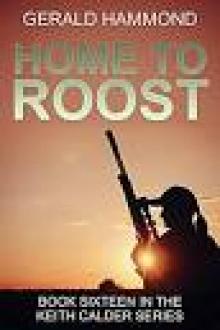 Home to Roost
Home to Roost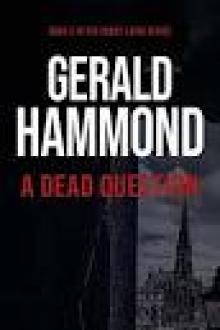 A Dead Question
A Dead Question Twice Bitten
Twice Bitten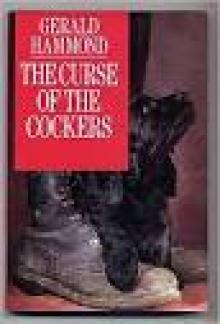 The Curse of the Cockers
The Curse of the Cockers In Loving Memory
In Loving Memory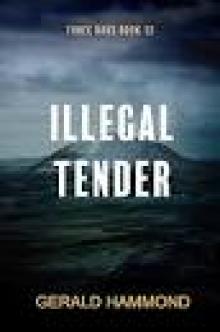 Illegal Tender (Three Oaks Book 12)
Illegal Tender (Three Oaks Book 12)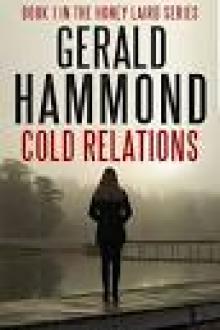 Cold Relations (Honey Laird Book 1)
Cold Relations (Honey Laird Book 1)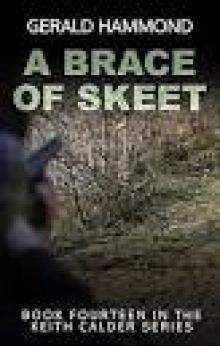 A Brace of Skeet
A Brace of Skeet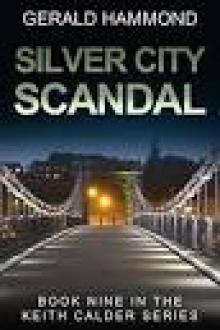 Silver City Scandal
Silver City Scandal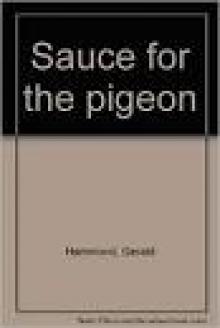 Sauce For the Pigeon
Sauce For the Pigeon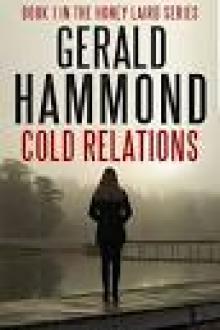 Cold Relations
Cold Relations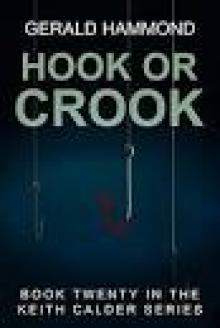 Hook or Crook
Hook or Crook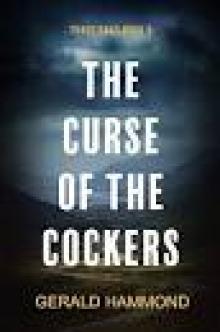 The Curse of the Cockers (Three Oaks Book 5)
The Curse of the Cockers (Three Oaks Book 5)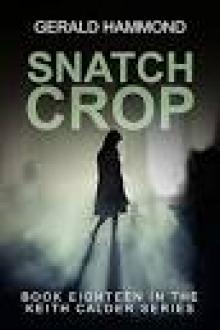 Snatch Crop
Snatch Crop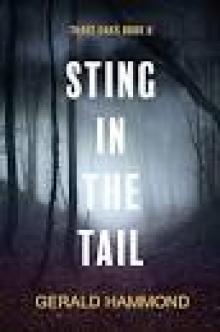 Sting in the Tail (Three Oaks Book 6)
Sting in the Tail (Three Oaks Book 6)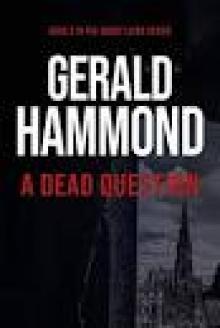 A Dead Question (Honey Laird Book 2)
A Dead Question (Honey Laird Book 2)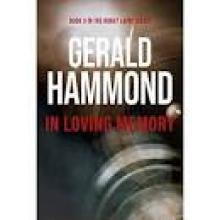 In Loving Memory (Honey Laird Book 3)
In Loving Memory (Honey Laird Book 3) Thin Air
Thin Air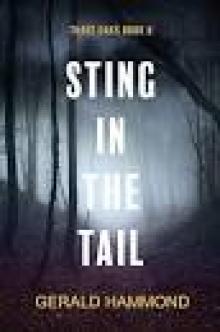 Sting in the Tail
Sting in the Tail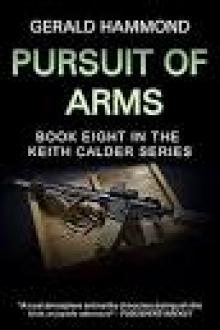 Pursuit of Arms
Pursuit of Arms The Game
The Game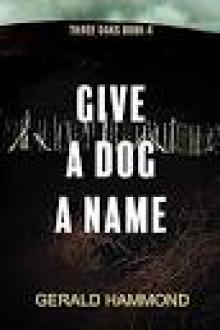 Give a Dog a Name (Three Oaks Book 4)
Give a Dog a Name (Three Oaks Book 4) Fair Game
Fair Game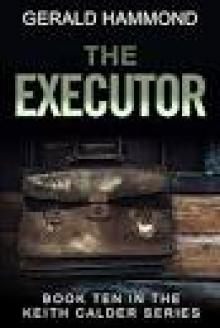 The Executor (Keith Calder Book 10)
The Executor (Keith Calder Book 10) Whose Dog Are You? (Three Oaks Book 2)
Whose Dog Are You? (Three Oaks Book 2)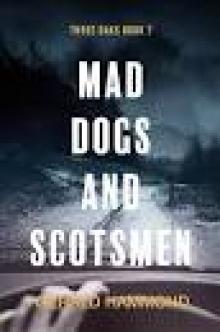 Mad Dogs and Scotsmen (Three Oaks Book 7)
Mad Dogs and Scotsmen (Three Oaks Book 7) Cousin Once Removed
Cousin Once Removed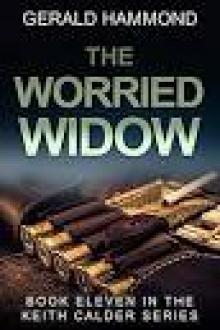 The Worried Widow
The Worried Widow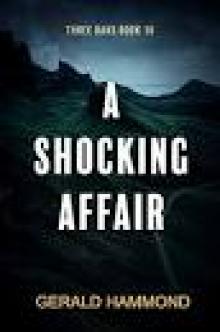 A Shocking Affair
A Shocking Affair Dead Weight (Three Oaks Book 11)
Dead Weight (Three Oaks Book 11) Whose Dog Are You
Whose Dog Are You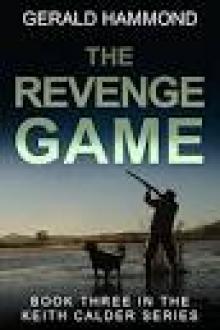 The Revenge Game
The Revenge Game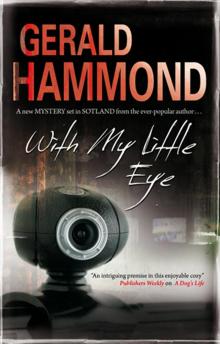 With My Little Eye
With My Little Eye Doghouse (Three Oaks Book 3)
Doghouse (Three Oaks Book 3)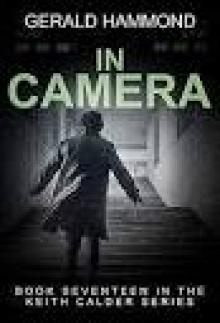 In Camera
In Camera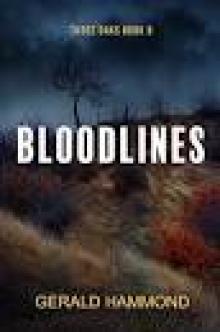 Bloodlines (Three Oaks Book 8)
Bloodlines (Three Oaks Book 8)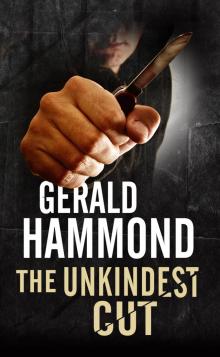 The Unkindest Cut
The Unkindest Cut